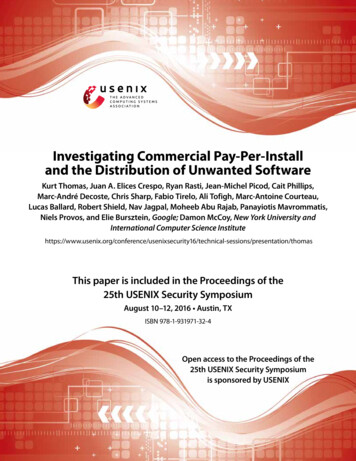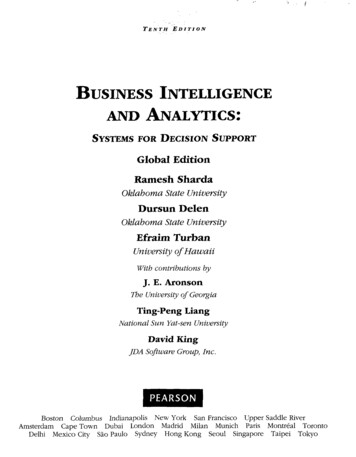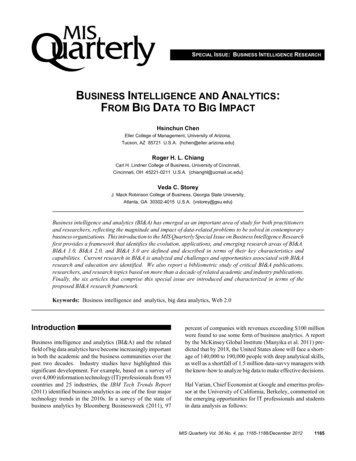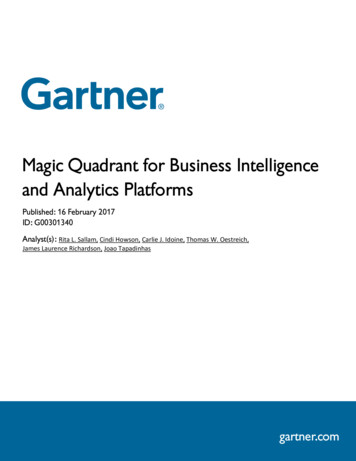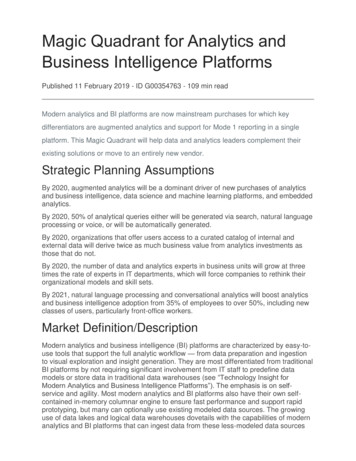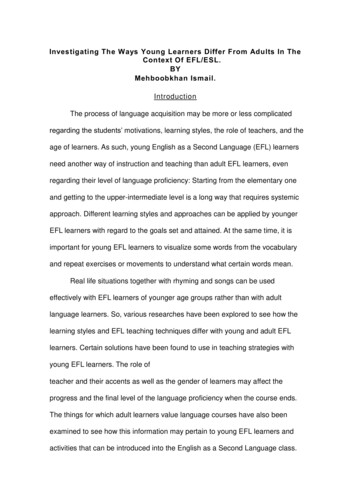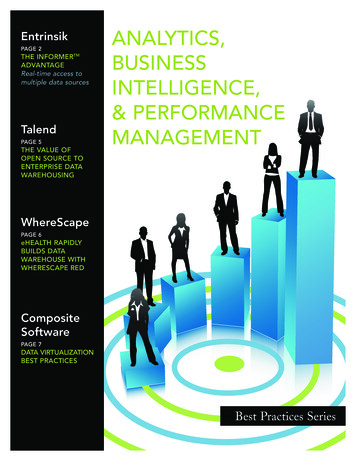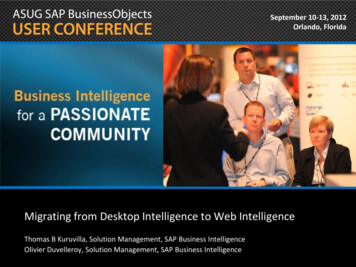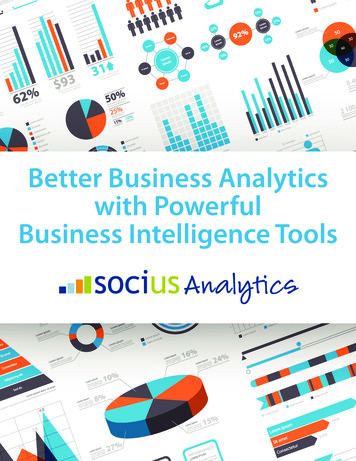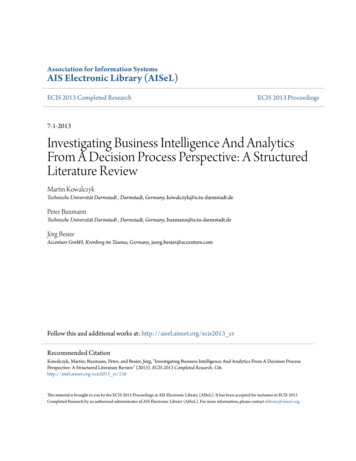
Transcription
Association for Information SystemsAIS Electronic Library (AISeL)ECIS 2013 Completed ResearchECIS 2013 Proceedings7-1-2013Investigating Business Intelligence And AnalyticsFrom A Decision Process Perspective: A StructuredLiterature ReviewMartin KowalczykTechnische Universität Darmstadt , Darmstadt, Germany, kowalczyk@is.tu-darmstadt.dePeter BuxmannTechnische Universität Darmstadt , Darmstadt, Germany, buxmann@is.tu-darmstadt.deJörg BesierAccenture GmbH, Kronberg im Taunus, Germany, joerg.besier@accenture.comFollow this and additional works at: http://aisel.aisnet.org/ecis2013 crRecommended CitationKowalczyk, Martin; Buxmann, Peter; and Besier, Jörg, "Investigating Business Intelligence And Analytics From A Decision ProcessPerspective: A Structured Literature Review" (2013). ECIS 2013 Completed Research. 126.http://aisel.aisnet.org/ecis2013 cr/126This material is brought to you by the ECIS 2013 Proceedings at AIS Electronic Library (AISeL). It has been accepted for inclusion in ECIS 2013Completed Research by an authorized administrator of AIS Electronic Library (AISeL). For more information, please contact elibrary@aisnet.org.
Proceedings of the 21st European Conference on Information SystemsINVESTIGATING BUSINESS INTELLIGENCE ANDANALYTICS FROM A DECISION PROCESS PERSPECTIVE:A STRUCTURED LITERATURE REVIEWKowalczyk, Martin, Technische Universität Darmstadt, Hochschulstr. 1, 64289 Darmstadt,Germany, Kowalczyk@is.tu-darmstadt.deBuxmann, Peter, Technische Universität Darmstadt, Hochschulstr. 1, 64289 Darmstadt,Germany, Buxmann@is.tu-darmstadt.deBesier, Jörg, Accenture GmbH, Campus Kronberg 1, 61476 Kronberg im Taunus, Germany,joerg.besier@accenture.comAbstractIn recent years business intelligence and analytics have gained an increasing amount of interestamong researchers and practitioners due to a number of success cases that have reported tremendousimprovements in organizational performance. Despite evidence from those success stories, therealizable benefits from such decision support technologies depend on their effects on organizationaldecision processes. Evidence on those effects is scattered throughout management and decisionsupport systems research. The need for more integrative research on this topic has been expressedfrom both research communities. Therefore we focused our research goal on those effects andconducted a structured and extensive literature review. In this context, this paper provides three majorcontributions. First, we develop a research framework by integrating existing results on managerialdecision processes. Then, using this research framework, we present the results from the structuredliterature review on the effects of decision support technologies on the distinct phases, characteristicsand outcomes of decision processes. Finally, we discuss the findings and implications for businessintelligence and analytics systems from a decision process perspective and propose future researchdirections.Keywords: Business Intelligence, Business Analytics, Decision Processes, Decision Support Systems,Literature Review.1
Proceedings of the 21st European Conference on Information Systems1IntroductionIn recent years the idea of business intelligence and analytics (BI&A) has gained an increasing amountof interest among researchers and practitioners due to a number of published success cases. Thesesuccess cases report tremendous improvements in organizational performance, based on improveddecision making and new business insights (Chen et al. 2012; Davenport 2006). BI&A systemsprovide support for collecting and transforming data and put particular emphasis on data analysis withthe purpose of improving decision making (Chen et al. 2012; Davenport 2006; Shanks et al. 2010).BI&A systems can be attributed to the research area of decision support systems (DSS), which dealswith information systems and their potential to support decision making (Arnott and Pervan 2008). Inthis respect, what is understood today as BI&A has been shaped by DSS research and developments insystems like personal decision support systems, executive information systems and data warehouses(Arnott and Pervan 2008; Chen et al. 2012; Shanks et al. 2010; Watson 2010).In order to achieve performance benefits from BI&A systems, organizations need to focus on theirdecision processes (Davenport 2010; Shanks et al. 2010). Decision processes represent the routines bywhich decisions are made in organizations (Mintzberg et al. 1976; Nutt 2008). The success of utilizingBI&A technologies highly depends on their integration with organizational decision processes(Brohman et al. 2000; Davenport 2010; Kanungo 2009; Shanks et al. 2010). Achieving suchintegration requires an understanding of how these technologies affect decision processes. Therefore,missing understanding of these effects can constrain successful utilization (Watson et al. 2002).In this context, recent literature reviews however find that decision processes have not receivedenough attention: Shollo and Kautz (2010) analyze conceptions of business intelligence (BI) andconclude that only very few studies address decision processes. Moreover, they find that although BIis described as a data-driven process for decision support, it often remains unclear how BI is used indecision processes and what effects it has on decision processes. Arnott and Pervan (2008) provide areview of the DSS discipline and find that, although DSS research has the mission of improvingmanagerial decision making, less than half of the investigated publications are explicitly related tomanagerial decision making research. They state that this creates a risk for the relevance of DSSresearch. Furthermore, they find that the amount of interrelation to managerial decision makingresearch even decreases for technologies like data warehouses and business intelligence. Hence, recentliterature reviews suggest more focus on decision processes and better integration of insights frommanagerial decision making research (Arnott and Pervan 2008; Shollo and Kautz 2010).In light of these results, it becomes less surprising that although the general ideas of DSS research areconsistent with management research on decision processes, the actual visibility of DSS researchseems to be quite low in related management research (Papadakis et al. 2010). Papadakis et al. (2010)identify a major research gap with respect to the effects of information systems use on managerialdecision making processes and explicitly call for more research in this area.Taking into account the discussed perspectives it seems that there is a need for more integrativeresearch with respect to the effects of technologies like business intelligence and analytics on decisionprocesses. Therefore the goal of this research is to investigate and give an overview on the effects ofthose systems on decision processes. Research on decision processes is interdisciplinary and in orderto support future work at this interface this paper makes three main contributions. First, we develop aresearch framework, based on existing results from managerial decision process research and decisionsupport systems research. Then, using this research framework, we present results from a structuredliterature review and thus integrate existing insights on the effects of decision support technologies onthe distinct phases and attributes of decision processes. Finally, we propose future research directionsin the area of managerial decision processes, as well as business intelligence and analytics.This paper is organized as follows: The second section discusses the DSS background of this research.Additionally it develops a decision process research framework, which will be used for analyzing the2
Proceedings of the 21st European Conference on Information Systemsresults of our literature review. The third section describes our procedure for performing the literaturereview and documents the literature search process and its results. The fourth section presents theresults from the literature study and the fifth section discusses those results. The sixth sectionidentifies future research opportunities and the last section concludes this paper.2Decision Support and Decision ProcessesThis section starts with a conceptualization of the DSS research area. Next we discuss decisionprocesses and we integrate existing concepts into a research framework that will be used forstructuring and analysis of our literature review, as recommended by Webster and Watson (2002). Theconceptualization and scoping performed in this section are also the basis for specifying search termsand inclusion/ exclusion criteria for the literature search process (see vom Brocke et al. 2009).2.1DSS Background and Technological ConceptualizationAlthough BI&A are the most current technologies for supporting managerial decision making,research and systems in this area have evolved over several years. One of the earlier reviews on theeffects of use of decision support systems was done by Benbasat and Nault (1990). In their analysisthey come to the conclusion that empirical investigations on the overall performance effects of DSSare inconclusive, as some studies report positive effects and others do not. They find several reasonsfor this, which are variances in the investigated variables, a lack of distinction between decision aidingtechniques and a lack of process focus. Benbasat and Nault (1990) provide a functional classificationof DSS, but they do not link it to distinct decision processes phases or characteristics.The recent review by Arnott and Pervan (2008) provides a high-level overview on the DSS field. Theyclassify the DSS field into: Personal DSS, group support system, negotiation support systems,intelligent DSS, knowledge management-based DSS, data warehousing and enterprise reporting andanalysis systems (incl. business intelligence, executive information and performance managementsystems). In their study they find, among others that within the DSS field, the newer technologicalsub-fields of data warehouses and BI are sub-fields that are least grounded in decision makingresearch. This creates a risk of decoupling technologies from their actual purpose in decision processes(Shanks et al. 2010). These results are supported by findings of Shollo and Kautz (2010) in the contextof BI systems and they conclude that decision processes are not considered enough.BI&A includes collection, analysis and dissemination of information with the purpose of supportingdecision making (Davenport 2010; Watson 2010). Thus, the focus of BI&A can be related to processmodels for modeling and predicting real-world processes, choice models for supporting decisionmaking, analysis and reasoning methods, as well as information control techniques. We subsequentlyfocus our research on these technological aspects. We do not include representational aids, judgmentand group supporting techniques, as former are broadly covered in human-computer interactionresearch and latter mainly address different facets of communication and group collaboration. Afterthis technological conceptualization, we develop a research framework for decision processes.2.2Decision Process Background and Research FrameworkIn order to systematically investigate the effects that decision support technologies have on decisionprocesses it is necessary to operationalize those effects. For this purpose we define decision processesby using a phase-based conception defined by Mintzberg et al. (1976) and we discuss common qualityattributes of decision processes from management research.Mintzberg et al. (1976) developed a decision processes conception, which includes phases for (1)identification, (2) development, and (3) selection. They investigated the decision process phases andfound that distinct steps within those phases are performed iteratively, rather than sequentially during3
Proceedings of the 21st European Conference on Information Systemsdecision making. Additionally, they found that competing steps exist within each phase. Thisconception of the decision process has been further refined and extended in decision process research(e.g. Nutt 2008), as well as partially adopted in the DSS field.For investigations of the quality of decision processes two main dimensions of attributes have beensuggested in management research: Decision process characteristics and decision process outcomes(Papadakis et al. 2010; Rajagopalan et al. 1993). Process outcomes describe the results from a decisionprocess or its sub-phases. In contrast, decision process characteristics encompass procedural attributesthat are related to the execution of the process (Papadakis et al. 2010; Rajagopalan et al. 1993). Inorder to obtain a comprehensive view on a decision process it is important to consider attributesrelated to process characteristics and process outcomes (Forgionne 1999; Phillips-Wren et al. 2004).Research by Forgionne (1999) comes to the conclusion that this is seldom the case in DSS research.This may lead to a fragmentation of insights with respect to the effects on decision processes.Therefore, our research framework combines a selection of process outcomes, as well as processcharacteristics that are considered as relevant in managerial decision process research. The frameworkconsiders the decision process phases (1) identification, (2) development and (3) selection, and wefocus on the following attributes for each of the three phases: Information quality: One of the major benefits of BI&A systems is the provision of accurate,high quality information which is easily accessible (Davenport 2010; Watson et al. 2002).Therefore usage of such systems should make available information of better quality. Comprehensiveness and procedural rationality: In managerial decision process researchprocedural rationality describes the level of reliance upon analysis of information in decisionmaking and comprehensiveness characterizes the exte
Investigating Business Intelligence And Analytics From A Decision Process Perspective: A Structured Literature Review Martin Kowalczyk Technische Universität Darmstadt , Darmstadt, Germany, kowalczyk@is.tu-darmstadt.de Peter Buxmann Technische Universität Darmstadt , Darmstadt, Germany, buxmann@is.tu-darmstadt.de Jörg Besier Accenture GmbH, Kronberg im Taunus, Germany,

